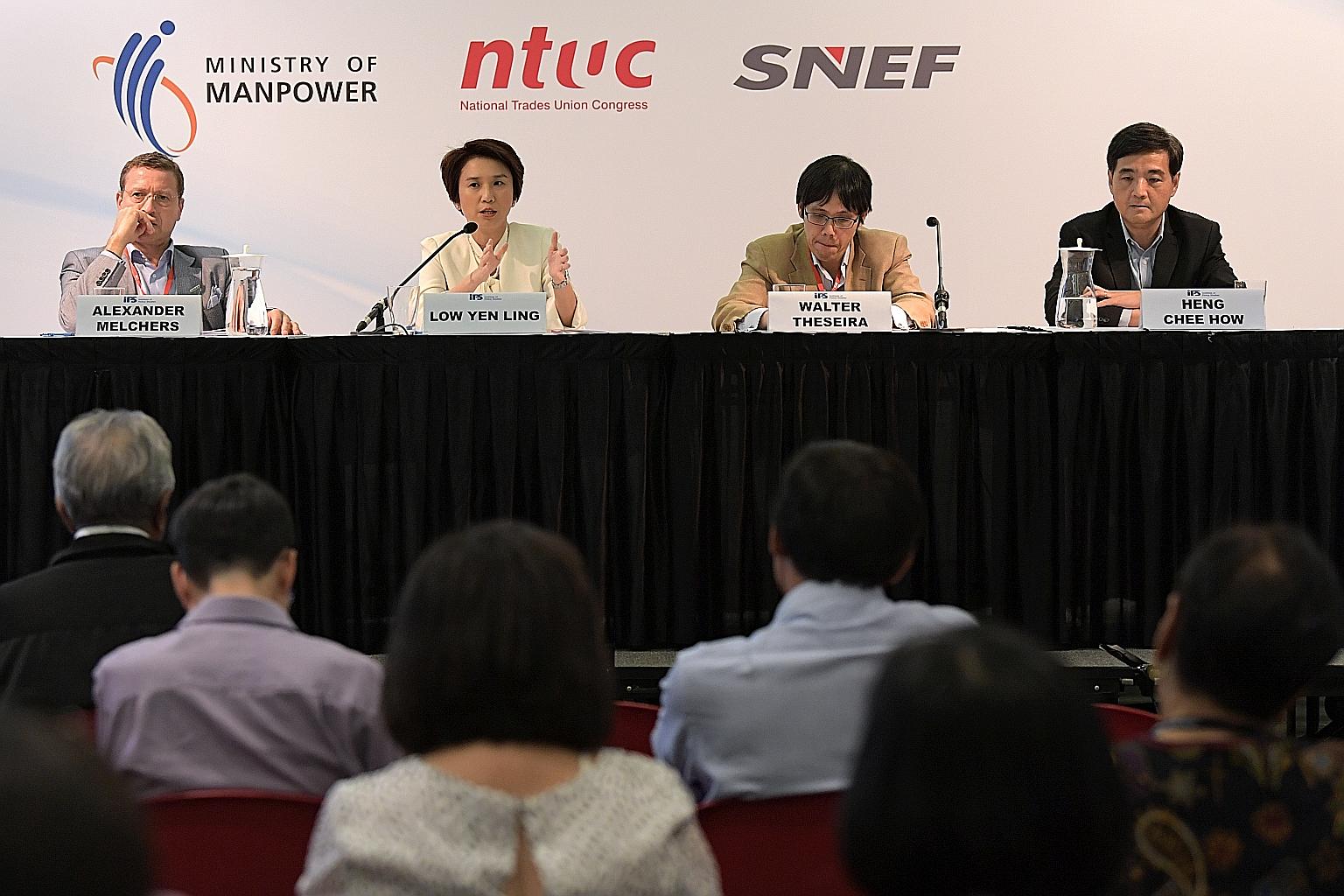Panellists discuss ways to help older workers
Feedback gathered by workgroup shows idea of retirement age remains relevant
Sign up now: Get ST's newsletters delivered to your inbox

(From far left) Speaking at a dialogue session at the forum yesterday were Singapore National Employers Federation vice-president Alexander Melchers, Senior Parliamentary Secretary for Manpower Low Yen Ling, Nominated MP Walter Theseira, who chaired the session, and National Trades Union Congress deputy secretary-general Heng Chee How.
ST PHOTO: NG SOR LUAN
The concept of a retirement age and re-employment age is still relevant, based on feedback gathered by a workgroup looking at policies for older workers.
While every older worker would want to continue to enjoy the same wages and benefits as long as they are working, this must be balanced with ensuring that they remain employable and companies remain competitive, Senior Parliamentary Secretary for Manpower Low Yen Ling said yesterday.
"If the view of the employers is such that the labour market is quite rigid, not flexible enough, you may not see the effect immediately, but when the next investment decision comes, that is when maybe Singapore as a location may not be as attractive," she said.
Unlike Singapore, countries such as Australia and Britain are very large markets and have a critical mass of local companies to provide employment, even if overseas companies choose to leave.
Ms Low was responding to a comment by former Nominated MP Kanwaljit Soin at the Institute of Policy Studies Forum on Older Workers.
Dr Soin had listed those two countries as examples of places where the retirement age was done away with, without affecting competitiveness.
Ms Low was on a panel together with Singapore National Employers Federation vice-president Alexander Melchers and National Trades Union Congress deputy secretary-general Heng Chee How. All three are members of the Tripartite Workgroup on Older Workers.
The workgroup - which was first announced in May last year - is, among other things, reviewing the longer-term relevance of the retirement and re-employment ages, and examining the impact of Central Provident Fund contribution rates for older workers on retirement adequacy.
The proportion of older workers in the workforce has grown over the years, and there are various forms of support for employers to hire and retrain them, such as wage subsidies.
Singapore's full-time employment rate for resident workers aged 55 to 64 was 58.8 per cent in June 2017, placing the Republic in the ninth position against Organisation for Economic Cooperation and Development (OECD) countries.
But the Manpower Ministry's divisional director for the workplace policy and strategy division, Mr Lee Pak Sing, said in a presentation at the forum that there is scope to raise the part-time employment rate for older workers, which stood at 8.3 per cent in 2017 for Singapore residents aged 55 to 64. This places Singapore in 23rd position against the OECD countries.
Offering more flexible work arrangements might be one way to help older workers continue working, several speakers suggested.
Many workers want flexibility in changing the intensity of work as they age, said Mr Vikas Sharma, research director of Blackbox Research, which organised public engagement sessions for the workgroup.
"They want a gentle progression from a full job scope to something that is more amenable to them as they advance in their years," he said in a presentation at the forum at the Devan Nair Institute for Employment and Employability. This could involve part-time work, flexible schedules or mentoring roles, for example.
The workgroup has held discussions with workers, public officers, union leaders, employers and human resource professionals across different industries and age groups.
Some of the concerns raised by workers included the stress of being on yearly contracts while re-employed, while employers worried about the rising cost of insurance coverage for older workers, said Mr Sharma.
Speakers and participants at yesterday's forum suggested portable medical benefits and raising the training participation rate among older workers as other ways to help them.


